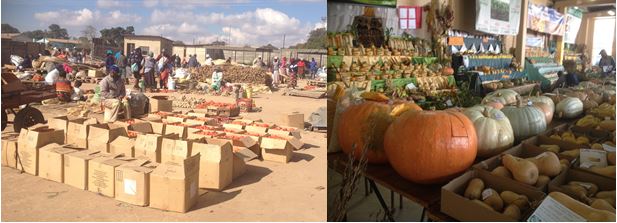Most African economies are often presented as being dual, comprising the formal and informal economy. However, in real practice the two parts function as a hybrid economy which borrows from the two parts. Nowhere is this scenario more visible than in the agriculture sector where there is a fusion of formal and informal approaches all the way from production to the market. While efforts to formalize African economies are based on technical approaches, carefully harnessing lessons from the open and informal market will transform African economies in unique ways. Rather than wholesale formalization, a key starting point should be understanding resilience elements of African informal markets.

Exploring the intersection between formal and informal economies
Open informal markets seem to have an in-built dynamism and resilience that enable them to cope with a rapidly globalizing economy. The same cannot be said about formal institutions such as parastatals which seem to have not been designed for a networked global economy. Where formal institutions plan in terms of months, quarters and years, open and informal markets plan in terms of hours, days and weeks. Such emergency mindsets enable informal institutions to deal with economic uncertainties in ways that formal and hierarchical institutions cannot. It looks like ideas and knowledge from several traders and market actors can inform joint action between formal and informal economic development initiatives. Such a hybrid socio-economic development model can generate superior outcomes than continue treating formal and informal economies as separate entities.
The power of stories in building a hybrid economy
Most participatory methods that have dominated African agriculture and rural development for decades have not sufficiently influenced agriculture markets. One of the reasons for mediocre success is that selling agricultural commodities has been considered a single transaction yet it should be a continuous relationship building and learning process, full of stories. While agricultural production is often a technical process, stories have a more powerful role in pitching commodities to consumers and engaging with customers as well as building a strong rapport with potential customers.

The hybrid character of African agricultural economies tends to be visible in open markets. Each commodity on the market tells its own story through its appearance. Commodities that have travelled a long distance to the market can communicate that fact. On the other hand, consumers who engage with farmers in the market trust the farmers’ capability to produce food the right way. This trust between farmers, traders and consumers is reinforced through stories that are shared in the market. The stories are used to persuade and influence consumers and other buyers.
Creative farmers and traders have developed smart ways of demonstrating what is common between them and potential customers. Those who have been in the open market for years have fully studied consumer behavior. They know that consumers like people who are just like them and they buy from people they like. That is why totems and home area often influence buying decisions. A consumer is most likely to buy from a farmer or trader who comes from his/her home area. That makes a difference between a farmer/trader who stays in agribusiness for years and the one who does not.
Rather than quickly getting down to business, farmers, traders, consumers, transporters and many other actors devote meaningful time to cultivating relationships in the market through stories. At the end, a handshake is a more powerful contract than a written document. A trader is convinced the farmer with whom s/he shared a story will certainly bring what s/he promised to the market. Going forward, stories are further used to win and retain new customers and build more relationships. Through a series of individual and collective stories, open markets keep every value chain actor motivated and focused to fulfil everyone’s expectations. Every story is more than a socio-economic contract that contributes to the resilience of the whole food economy. The effectiveness of such contracts is revealed through no cases of farmers and traders suing each other for failure to honor any contract.
How technical people can harness knowledge from informal markets
Productive economic hybrids between formal and informal economies can become a reality when technical experts embrace humility in the awareness that they do not know everything. They have to share their individual uncertainties, hesitations, doubts and fears in order to gain collective confidence from informal actors. The next level should be building communities of practice comprising actors from both the formal mindset towards creating a safe place to test alternative ideas that can inform emergent socio-economic solutions. It is not helpful to continue pretending we have two separate economies that do not overlap or speak to each other. The informal economy has actors who are good at accumulating ideas, sampling new practices as well as mixing and matching what they learn as they work. Such capacity to navigate multiple domains is very important in an increasingly networked global economy that African economies find themselves.
The formal mindset has enormous value in promoting specialization that makes economic planning predictable. Bringing them together with informal actors will produce a productive blend of efforts comprising those who are cautious and those not afraid to cross socio-economic boundaries and sometimes break those boundaries. Besides seeing socio-economic patterns ahead of everyone else, actors in African informal markets are adept at living on the edge of the future and detecting signals from a wide range of people and ideas at their disposal. That enables them to quickly adjust to dynamic economic environments. Such agility is often lacking in formal institutions. It is through organized cross-pollination between formal and informal economies that developing countries will be able to generate sustainable solutions to their wicked socio-economic challenges. Advice from big global institutions will not make much difference without local knowledge from the informal and open market where practical tangible and intangible knowledge is generated every day.
charles@knowledgetransafrica.com / charles@emkambo.co.zw / info@knowledgetransafrica.com
Website: www.emkambo.co.zw / www.knowledgetransafrica.com
eMkambo Call Centre: 0771 859000-5/ 0716 331140-5 / 0739 866 343-6
